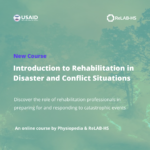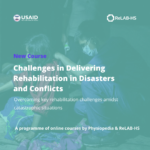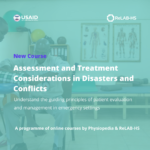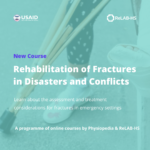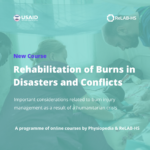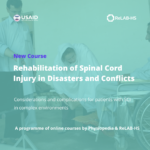Between Monday 4 April and Sunday 5 June these new courses will be free for everyone and will remain free for Ukrainians and people in LMIC settings.
One of the most important factors in rehabilitation is the impact of contextual factors, including the overall context in which rehabilitation takes place. We know that the environment is known to have a significant impact on treatment generally. Therefore, the circumstances surrounding rehabilitation, from the situation before, during and after the event leading to a loss in function, are all important factors to consider throughout the rehabilitation process. The context in which rehabilitation occurs also greatly influences the range and availability of rehabilitation services and their utilisation.
Despite disasters and conflicts being challenging contexts, rehabilitation has been integrated into the emergency responses within these contexts since the first world war, albeit traditionally only considered at the later stages of response. Due to advances in response, management and post-medical care in disaster situations, high mortality rates have gradually transitioned to increased morbidity rates. As a result, in more recent disasters, such as the 2015 Nepal earthquake and the 2020 explosion in Beirut, Lebanon, there has been a definite shift in this with the concept of ‘early rehabilitation’ positioning itself firmly within the initial emergency response phase. In humanitarian emergency situations, such as during or post-conflict and disaster situations, the need for basic functional rehabilitation services is overwhelming and critical to preventing disability and improving the lives of people with disabilities.
Our new courses aims to equip rehabilitation professionals with a comprehensive knowledge of rehabilitation within the context of disaster and conflict situations, so that they can play an effective role in providing quality early rehabilitation that goes beyond life-and-limb-saving to deliver care that maximises functional outcomes.
Instructors
Funded by the United States Agency for International Development (USAID), the Learning, Acting and Building for Rehabilitation in Health Systems Consortium (ReLAB-HS) is a global project that will support the development of health systems that are responsive to the growing needs for rehabilitation within populations. It seeks to co-design and implement innovative, comprehensive, cost-effective interventions that strengthen health systems for the provision of rehabilitation, including assistive technology.
ReLAB-HS is made possible by the generous support of the American people through the United States Agency for International Development (USAID) and is implemented under cooperative agreement number 7200AA20CA00033. The consortium is managed by the prime recipient, Johns Hopkins Bloomberg School of Public Health.

Courses
So far we have six courses published and available now with three more coming in the next week. The three courses soon to be published are:
- Rehabilitation of Peripheral Nerve Injuries in Disasters and Conflicts
- Rehabilitation of Amputations in Disasters and Conflicts
- Rehabilitation of Acquired Brain Injury in Disasters and Conflicts
We’ll let you know via social media when these courses are live so don’t forget to follow us! The courses available now are listed below.
